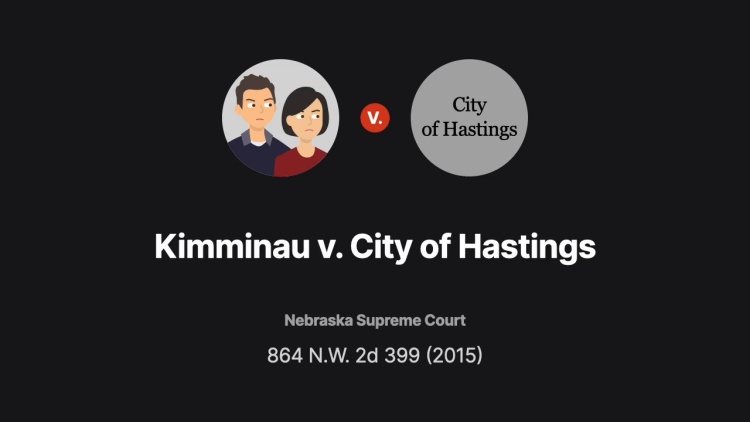Kimminau v. City of Hastings
Nebraska Supreme Court
291 Neb. 133 (2015)
- Written by Heather Whittemore, JD
Facts
On November 15, 2009, Wayne Todd (defendant) was driving a truck owned by R Lazy K Trucking, Inc. (the trucking company) (defendant) when he caused corn mash, an industrial by-product that was fed to cattle, to spill onto a road. Fire departments (defendants) for the city of Hastings, Nebraska, closed the road and cleaned up the spill, moving the corn mash from the road into ditches on the other side of the shoulder of the road. After the fire departments finished cleaning up the spill, they determined that the road was safe and reopened it to traffic. The next day, Kaelynn Kimminau (plaintiff) was driving on the road when she drove into the corn mash and lost control of her vehicle, sustaining injuries in the accident. Kaelynn and her husband, Wayne Kimminau (plaintiff), filed a negligence lawsuit in state court against Todd, the trucking company, and the Hastings fire departments. The Kimminaus argued that Todd and the trucking company owed Kaelynn and other drivers a duty of care to prevent injuries caused by the corn-mash spill and that Todd and the trucking company breached that duty by failing to use ordinary care. The district court granted summary judgment for Todd and the trucking company, holding that Todd and the trucking company did not owe Kaelynn a duty of care. The district court reasoned that it would be against public policy to impose a duty of care on drivers who created a road obstruction if that obstruction was removed by public authorities. The Kimminaus appealed.
Rule of Law
Issue
Holding and Reasoning (Stephan, J.)
What to do next…
Here's why 905,000 law students have relied on our case briefs:
- Written by law professors and practitioners, not other law students. 47,100 briefs, keyed to 995 casebooks. Top-notch customer support.
- The right amount of information, includes the facts, issues, rule of law, holding and reasoning, and any concurrences and dissents.
- Access in your classes, works on your mobile and tablet. Massive library of related video lessons and high quality multiple-choice questions.
- Easy to use, uniform format for every case brief. Written in plain English, not in legalese. Our briefs summarize and simplify; they don’t just repeat the court’s language.






